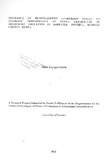| dc.description.abstract | The purpose of the study was to establish the influence of head teacher leadership styles, and performance at KCSE examination in Koibatek district. The questions that guided the study were to establish whether there was a relationship between headteacher's autocratic (authoritarian) leadership styles and student's performance at KCSE, to determine the influence of headteacher's democratic leadership styles in student's performance at KCSE, to establish if headteacher's Laisses-faire leadership styles influence student's performance at KCSE and to determine headteacher's charismatic leadership styles if it as an influence on student's performance at KCSE.
The study adapted descriptive research design, data were collected from 20 headteachers and 195 teachers drawn from 20 schools in the district. Findings revealed that there was a significant relationship between headteachers leadership styles and students performance (r-value = 0.33744). There was no significant relationship between teachers' gender, age, and academic qualification and their perception of their headteachers' leadership styles. There was no significant relationship across gender, age, academic qualifications, teaching experience and their experience as headteachers. Findings also revealed that there was no significant difference in headteachers leadership styles in various categories of schools.
Based on the findings, it was concluded that there was a significant relationship between headteachers leadership styles and students performance. The findings further revealed that autocratic leadership had high' performance in their schools. It was also concluded that majority of teachers perceived their headteachers as being democratic. Teachers felt that their headteachers were autocratic while perceived them as laissez- faire. The study also concluded that headteachers' perceived themselves as democratic as perceived themselves as authoritarian while perceived them as laissezfaire. It was also concluded that there was no significant relationship between teachers' gender, age, and academic qualification and their perception of their headteachers' leadership style.
The study concluded that there was no significant relationship across gender, age, academic qualifications, teaching experience and their experience as headteachers. Findings also revealed that there was no significant difference in headteachers' leadership styles in various categories of schools. The study recommended that there is need for facilitating headteachers leadership styles as they had a direct relationship with students' academic performance. It was also recommended that headteachers should use the most appropriate leadership that facilitates collective responsibility and which creates a conducive teaching and learning environment in schools; and lastly that there is need to involve teachers and parents in matters of students' performance in schools. | en_US |

